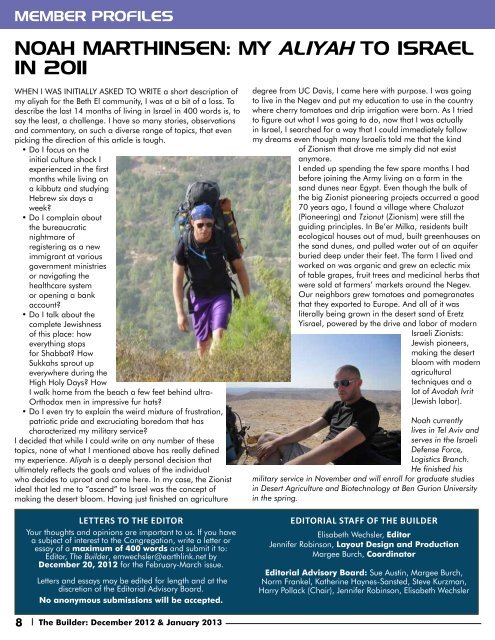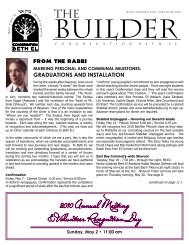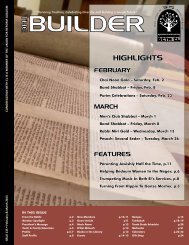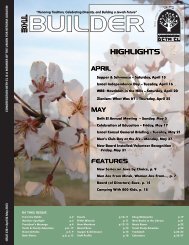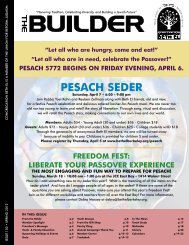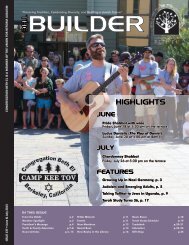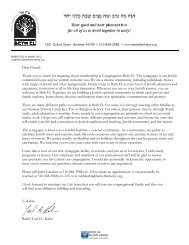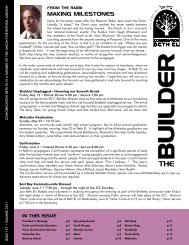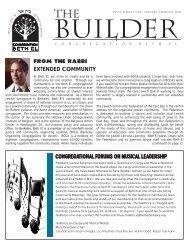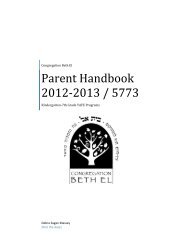December 2012-January 2013 - Congregation Beth El
December 2012-January 2013 - Congregation Beth El
December 2012-January 2013 - Congregation Beth El
Create successful ePaper yourself
Turn your PDF publications into a flip-book with our unique Google optimized e-Paper software.
Member Profiles<br />
Noah Marthinsen: My Aliyah to Israel<br />
in 2011<br />
When I was initially asked to write a short description of<br />
my aliyah for the <strong>Beth</strong> <strong>El</strong> community, I was at a bit of a loss. To<br />
describe the last 14 months of living in Israel in 400 words is, to<br />
say the least, a challenge. I have so many stories, observations<br />
and commentary, on such a diverse range of topics, that even<br />
picking the direction of this article is tough.<br />
• Do I focus on the<br />
initial culture shock I<br />
experienced in the first<br />
months while living on<br />
a kibbutz and studying<br />
Hebrew six days a<br />
week<br />
• Do I complain about<br />
the bureaucratic<br />
nightmare of<br />
registering as a new<br />
immigrant at various<br />
government ministries<br />
or navigating the<br />
healthcare system<br />
or opening a bank<br />
account<br />
• Do I talk about the<br />
complete Jewishness<br />
of this place: how<br />
everything stops<br />
for Shabbat How<br />
Sukkahs sprout up<br />
everywhere during the<br />
High Holy Days How<br />
I walk home from the beach a few feet behind ultra-<br />
Orthodox men in impressive fur hats<br />
• Do I even try to explain the weird mixture of frustration,<br />
patriotic pride and excruciating boredom that has<br />
characterized my military service<br />
I decided that while I could write on any number of these<br />
topics, none of what I mentioned above has really defined<br />
my experience. Aliyah is a deeply personal decision that<br />
ultimately reflects the goals and values of the individual<br />
who decides to uproot and come here. In my case, the Zionist<br />
ideal that led me to “ascend” to Israel was the concept of<br />
making the desert bloom. Having just finished an agriculture<br />
Letters to the Editor<br />
Your thoughts and opinions are important to us. If you have<br />
a subject of interest to the <strong>Congregation</strong>, write a letter or<br />
essay of a maximum of 400 words and submit it to:<br />
Editor, The Builder, emwechsler@earthlink.net by<br />
<strong>December</strong> 20, <strong>2012</strong> for the February-March issue.<br />
Letters and essays may be edited for length and at the<br />
discretion of the Editorial Advisory Board.<br />
No anonymous submissions will be accepted.<br />
degree from UC Davis, I came here with purpose. I was going<br />
to live in the Negev and put my education to use in the country<br />
where cherry tomatoes and drip irrigation were born. As I tried<br />
to figure out what I was going to do, now that I was actually<br />
in Israel, I searched for a way that I could immediately follow<br />
my dreams even though many Israelis told me that the kind<br />
of Zionism that drove me simply did not exist<br />
anymore.<br />
I ended up spending the few spare months I had<br />
before joining the Army living on a farm in the<br />
sand dunes near Egypt. Even though the bulk of<br />
the big Zionist pioneering projects occurred a good<br />
70 years ago, I found a village where Chaluzot<br />
(Pioneering) and Tzionut (Zionism) were still the<br />
guiding principles. In Be’er Milka, residents built<br />
ecological houses out of mud, built greenhouses on<br />
the sand dunes, and pulled water out of an aquifer<br />
buried deep under their feet. The farm I lived and<br />
worked on was organic and grew an eclectic mix<br />
of table grapes, fruit trees and medicinal herbs that<br />
were sold at farmers’ markets around the Negev.<br />
Our neighbors grew tomatoes and pomegranates<br />
that they exported to Europe. And all of it was<br />
literally being grown in the desert sand of Eretz<br />
Yisrael, powered by the drive and labor of modern<br />
Israeli Zionists:<br />
Jewish pioneers,<br />
making the desert<br />
bloom with modern<br />
agricultural<br />
techniques and a<br />
lot of Avodah Ivrit<br />
(Jewish labor).<br />
Noah currently<br />
lives in Tel Aviv and<br />
serves in the Israeli<br />
Defense Force,<br />
Logistics Branch.<br />
He finished his<br />
military service in November and will enroll for graduate studies<br />
in Desert Agriculture and Biotechnology at Ben Gurion University<br />
in the spring.<br />
Editorial Staff of The Builder<br />
<strong>El</strong>isabeth Wechsler, Editor<br />
Jennifer Robinson, Layout Design and Production<br />
Margee Burch, Coordinator<br />
Editorial Advisory Board: Sue Austin, Margee Burch,<br />
Norm Frankel, Katherine Haynes-Sansted, Steve Kurzman,<br />
Harry Pollack (Chair), Jennifer Robinson, <strong>El</strong>isabeth Wechsler<br />
8 The Builder: <strong>December</strong> <strong>2012</strong> & <strong>January</strong> <strong>2013</strong>


